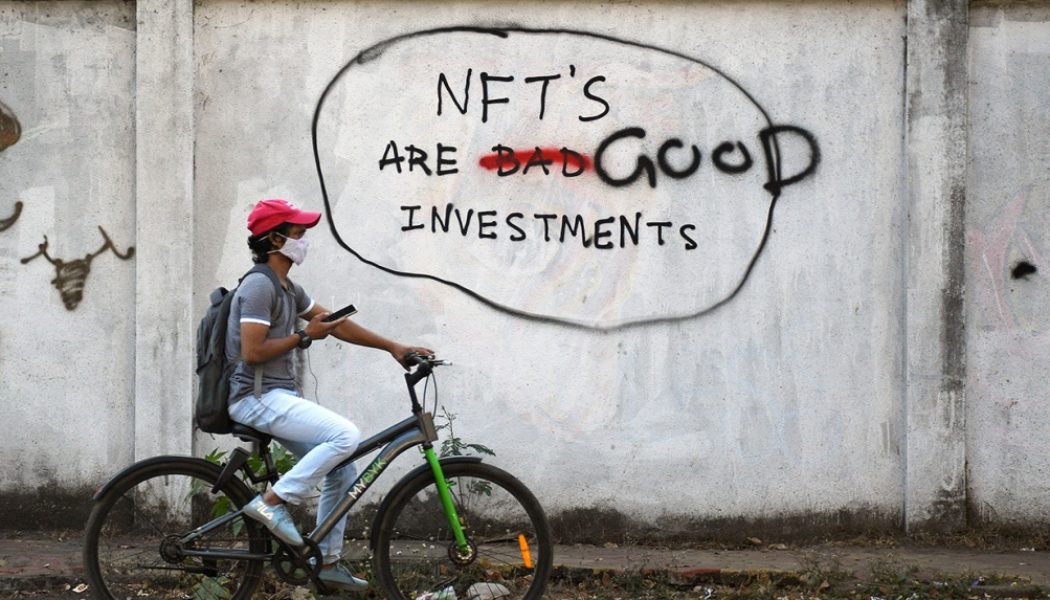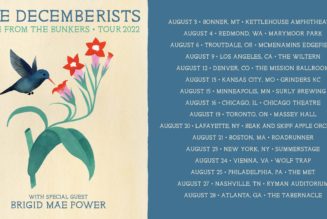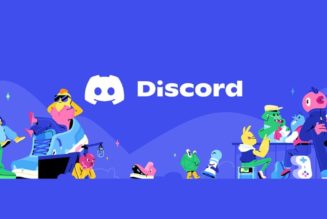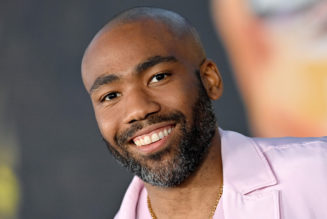
While the downfall of FTX and the Crypto Winter that saw NFT sales drop 90% dominated Web3 headlines this year, for many creators there was a bigger issue at play. Their royalties have been under attack, undermining a central promise of Web3 as a sustainable model for musicians.
Creator royalties on NFTs ensure that artists get paid a cut of revenue every time their work is sold on a secondary market. As the music NFT market has matured since multi-million dollar sales attracted widespread attention, these royalties have been a central part of the Web3 proposition — presenting musicians with a possible alternative to the major label system and allowing them to generate meaningful revenue over the long term. Only now, that promise is being pulled from under them as several new NFT platforms effectively or explicitly cut out creator royalties — even though it was a core part of the Web3 promise when they originally listed their NFTs for sale — in an aggressive bid for market share.
Even OpenSea, the largest NFT marketplace, briefly considered changing its policy before a deafening backlash from artists forced the company to double down on its commitment to royalties. OpenSea also introduced an “enforcement tool” allowing artists to blacklist rival marketplaces that don’t honor creator royalties. It’s a small win for creators although some have called it a “bandaid” as many growing platforms including Blur, Magic Eden, LooksRare and Sudoswap still do not enforce royalties by default. In some cases it’s a hardline policy, in others the royalty is “optional” allowing traders to opt out of paying the artist when they sell an NFT. Most traders opt out, making the effective royalty rate close to zero.
Creator royalties are the beating heart of Web3 and the primary reason why artists flocked to NFTs in the first place. “Coming from the music world, the promise of being able to earn royalties in perpetuity without the interference of middlemen, was something I could only dream about,” says Illa Da Producer, a 12-time platinum-certified music producer credited on Eminem’s “Killshot” and community lead at Yuga Labs, the company behind Bored Ape Yacht Club. The artist can choose their own royalty rate — typically 2.5% to 10% — and they are lucrative, earning more than $1 billion for creators on OpenSea in 2022 alone.
But there’s a problem. These royalties are not coded directly into the NFTs themselves. They were introduced by marketplaces like OpenSea, originally to attract artists to the space, which means they can be removed just as quickly.
None of this was an issue during the bull-run where cartoon animal JPEGs sold for over a million dollars a piece. Collectors were flush with crypto, happy to pay the artist royalty whenever they made a winning trade. But now the bubble has popped. The price of Ethereum has dropped by 75% and NFT volume is down 90% from the highs in January. NFT platforms are left fighting for market share in a shrinking economy and traders are trying to save as much money as possible.
In a desperate bid to attract users, rival marketplaces like X2Y2 effectively cut out creator royalties by making them “optional” — traders can choose not to pay the artist royalty when they sell their NFTs, therefore pocketing more money from each sale. Other platforms including Blur, LooksRare, Sudoswap and Magic Eden followed a similarly aggressive policy.
Creators were blunt in their criticism. “In many ways, it amounts to theft by the marketplace,” says Jeff Nicholas — founder of WRVPSound, a collection of 9,999 AI music NFTs and the biggest Web3 music project ever by volume at 6,115 ETH (~$7.15 million at current prices) traded, “If a project sets royalties in their terms of service and those royalties are not enforced.”
Nevertheless, it worked. Traders abandoned OpenSea in droves. The platform’s market share dropped from 80% earlier in the year down to 45% in November according to crypto research company Messari. As a result, OpenSea claims that more than $1 million of creator royalties was effectively bypassed in the first week of November alone. At risk of losing even more market share, OpenSea was forced to act quickly, launching a tool that allows artists to blacklist those rival marketplaces.
But there’s a catch. The tool only works for new NFTs. It would not work for the thousands of existing NFTs and projects. The future of royalties on these collections — including the Bored Ape Yacht Club, Doodles and Azuki, was left wide open. In a blog post, OpenSea put all options on the table, including the potential of optional royalties.
The backlash from artists was fierce. “The message to trading platforms like OpenSea is this,” says Gino the Ghost — a Grammy winning producer and founder of Web3 music project Blocktones — “You either stand firm to support the ethos of of Web3 as the creative revolution or you lose the trust and business of the very creatives that make you successful in the first place.”
Many artists spoke out about their fear of losing their livelihood if OpenSea followed through. “I am a transgender teen that escaped an abusive household through the power of NFTs,” wrote Fewocious — a 19 year old digital artist who’s built a massive following in Web3 — in a statement on Twitter. “And there are probably so many more artists, many of whom may not be as fortunate as me, who live off their artist royalties … Please reconsider removing royalties.”
Fewocious’ statement quickly spread across social media, garnering retweets from Snoop Dogg (“Power to tha artists”) and prompting further discussion from industry execs like Lady Gaga’s former manager Troy Carter, “Fucking over creators is very Web2.”
Founders in the space also warned that it would threaten the future of NFT companies, given that many projects rely on royalties to fund their business operations. “None of the top NFT projects you see would be where they are without them,” says Betty — founder of Deadfellaz, an NFT project that partnered with Steve Aoki in October for a Halloween merch drop and has generated more than $37 million in total volume since launching in 2021. “It’s why most of us flocked to this industry and it’s what platforms like Opensea were built on.”
After engaging with the community in several heated public debates, OpenSea clarified its position and promised to enforce creator royalties on all existing collections going forward. Speaking to Billboard, OpenSea admits they could have communicated better during this time. “We own that,” says Shiva Rajaraman, vp of product. However, he affirms that OpenSea has always stood behind artists and, while all options were discussed internally, OpenSea never truly wanted to cut out creators. “Honestly, the idea of just getting rid of creator fees made no sense.” Instead, OpenSea wants to put the power in the hands of creators, he explains. “We should respect, as platforms, that choice that is made [by creators], rather than make that variable.”
Meanwhile, the new on-chain enforcement tool — which Rajaraman describes as a “healthy tension against other marketplaces” — is beginning to work. At least one rival marketplace X2Y2 has backed down and conceded that it will also enforce royalties on all existing collections. OpenSea has since handed over ownership and control of the tool to a collective of several NFT platforms so that the community can be more involved in how it develops.
Artists have mostly responded positively. “This is actually a really good start to enforcing royalties,” says Nicholas. And it’s proof that artists can still make themselves heard, force change and define their terms in the nascent Web3 space. However, he also admits that this solution might just be a “bandaid.” Despite the progress made by artists in the last month, the final decision still appears to be in the hands of the marketplaces.
Some creators are therefore fighting for a complete change to the system. “[We need] a creator focussed and led solution,” says Deadfellaz’s Betty. “We’ve needed to come together for a long time … and work on solutions outside of centralized marketplaces.”
In the meantime, artists and OpenSea do agree that creator royalties should be enshrined as a social and cultural rule, even if they are not always honored by some marketplaces. “If we don’t,” says Nicholas. “Web3 runs the risk of going the same way every other technical innovation has over the last 20-plus years and squeezing the artists and creators yet again.”
[flexi-common-toolbar] [flexi-form class=”flexi_form_style” title=”Submit to Flexi” name=”my_form” ajax=”true”][flexi-form-tag type=”post_title” class=”fl-input” title=”Title” value=”” required=”true”][flexi-form-tag type=”category” title=”Select category”][flexi-form-tag type=”tag” title=”Insert tag”][flexi-form-tag type=”article” class=”fl-textarea” title=”Description” ][flexi-form-tag type=”file” title=”Select file” required=”true”][flexi-form-tag type=”submit” name=”submit” value=”Submit Now”] [/flexi-form]










Tagged: business, entertainment blog, music blog, NFTs, OpenSea, Royalties, Tech, web3